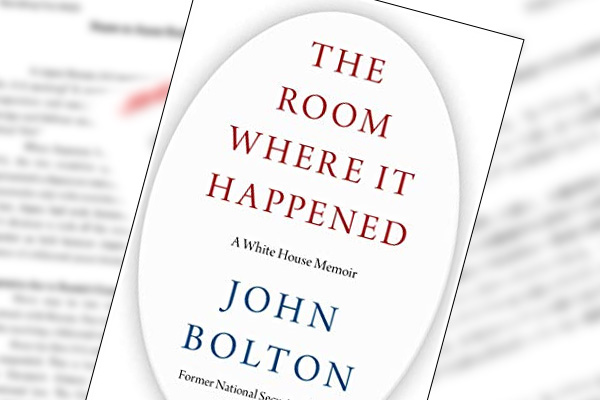It is understandable that U.S. conservatives campaigning for President Donald Trump’s reelection harshly criticize former presidential national security adviser John Bolton’s memoir as representing his betrayal. The criticism is the flip side of the fact that liberals highlight just the memoir’s unfavorable parts for the president.
However, we should not disregard the memoir’s positive significance including the clarification of a true picture of U.S.-North Korea negotiations.
Trump’s risky remark
The second U.S.-North Korea summit meeting in Hanoi in February 2019 broke off as President Trump walked away from the meeting. Even before the summit, Trump had indicated a plan to walk away from the meeting if a North Korean proposal were halfway. At the summit, he decided to implement the plan on his own. Bolton rated the Trump decision high by writing “he expressed the correct insight that ‘walking away’ in Hanoi made clear to the world he could do it elsewhere, such as in the China trade negotiations.”
North Korean Chairman Kim Jong Un attempted to have the U.S. accept a proposal that called on Washington to lift virtually all sanctions in exchange for Pyongyang’s vaguely defined dismantlement of Yongbyon nuclear facilities. The proposal was totally unacceptable for Bolton. There was a risky moment in the final phase of the meeting. Trump asked if Kim could add something to his offer, such as asking only for a percentage reduction in the sanctions rather than completely removing them. “This was beyond doubt the worst moment of the meeting," Bolton wrote. If Kim had come up with some compromise, Trump could have accepted it. Fortunately, however, Kim failed to make any new offer.
Bolton’s plan for the denuclearization of North Korea was unambiguous. North Korea would declare its nuclear facilities before the declaration is checked against U.S.-held information to select facilities subject to the dismantlement. Target facilities would be dismantled and shipped abroad in six to nine months before the sanctions are lifted. It was called a Libyan model. While describing South Korea’s Moon Jae In government negatively, Bolton gives high ratings to the Japanese Shinzo Abe administration’s attitude on North Korea.
Requests to Abe administration
However, Bolton made some requests to the Abe administration. The Japanese side once sent a message that two years would be required for North Korea’s complete denuclearization (e.g., then Foreign Minister Taro Kono’s remark to this effect made the news). This could send a wrong message. After Bolton conveyed his concern to the Japanese, Abe said at the next Japan-U.S. summit that the denuclearization should be completed in six to nine months, according to Bolton. The correction was good. In the future, any Japanese cabinet minister should refrain from mentioning off-the-cuff numbers.
While it was understandable for Abe to have been positioned to totally praise Trump’s North Korea policy, the Japanese prime minister should offer easy-to-understand cautions to avoid Trump’s misunderstanding, Bolton said.
This point is even more important after Bolton left the Trump administration as an inside cautioner. Bolton repeatedly and harshly criticized Stephen Biegun, deputy secretary of state and U.S. special representative for North Korea, for his weak attitude on negotiations with Pyongyang. Secretary of State Mike Pompeo has also failed to fully control the negotiations, according to Bolton. Japan should be alert to this.
Yoichi Shimada is a senior fellow and Planning Committee member, Japan Institute for National Fundamentals, and a professor at Fukui Prefectural University. He follows U.S. politics and diplomacy.


